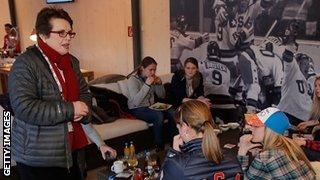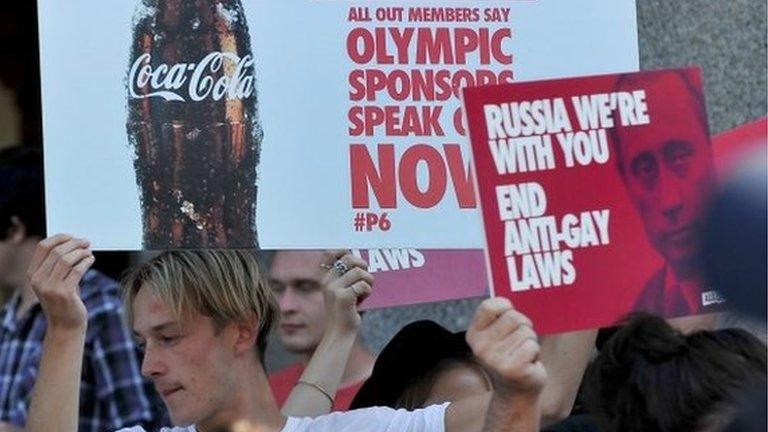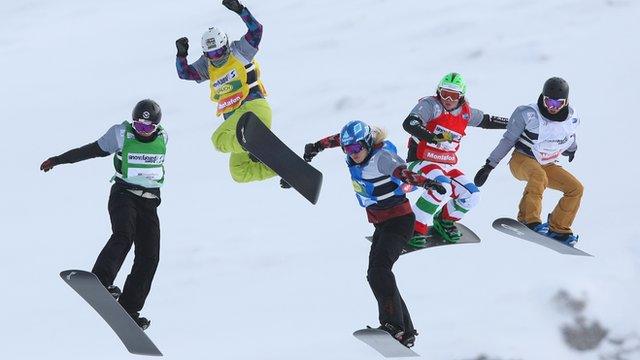Sochi 2014: Billie-Jean King in plea to IOC over venues
- Published
Billie Jean King has called on the International Olympic Committee to examine the gay rights and equal opportunity policies of prospective bidding nations when deciding who will host future winter and summer Games.
The retired tennis star, in Sochi as a member of President Obama's official delegation to the Winter Olympics, also called for the IOC's Charter, external to be amended to state specifically that discrimination over sexual orientation is forbidden.
The Obama administration's decision to include King in the official Sochi delegation was seen by observers as a sign of US opposition to Russia's anti-gay propaganda law.
Passed by Russia's parliament last year, the legislation allows authorities to impose heavy fines for providing information about homosexuality to people under 18.
Homosexuality was decriminalised in Russia in 1993, but anti-gay sentiment is high within the country.
A recent poll found that nearly half of Russians believe that the gay and lesbian community should not enjoy the same rights as other citizens.
King, 70, believes these Games have been "very successful" but thinks the IOC should now take a country's stance on gay rights into account when looking at bids from potential host cities.
In an interview with BBC Sport in Sochi she said: "In the [bid] process it would be helpful. I would like to see it but I also understand it's not that easy."
"If you can it would cut down the number of [eligible] countries. Sometimes it's good to go to a country where things aren't as good and help change things.
"I'm sure they'll [IOC] be looking at things differently the next time.
"Hopefully [IOC president] Mr [Thomas] Bach and the IOC will think about the next time they give a bid out - I hope that they'll look at discrimination as a big part of it. But no country is perfect. America certainly isn't."
Principle 6 of the Olympic Charter states "any form of discrimination with regard to a country or a person on grounds of race, religion, politics, gender or otherwise is incompatible with belonging to the Olympic Movement".
The IOC have stated that discrimination on grounds of sexual orientation is incorporated under the "or otherwise" wording.
But King, who acknowledged publicly that she is gay in 1981, believes greater clarity is needed but recognises the difficulties involved in making any change.
"I'd like it to say 'sexual orientation' as well and include it very specifically and I think that's important.
"You have to also remember it's not that easy.
"There are countries [where] I would be incarcerated [for being gay]. There are countries where I could be executed as a gay person.
"It sounds so easy from the outside but the internal situation to have change takes time, takes a lot of dialogue, there's a lot of politics in everything.
"We have to be patient but we have to keep pushing.

Billie-Jean King visits the US team in Sochi
"I think there'll be a lot of dialogue on that and I think that was brought to a head here in Sochi, about being more specific and saying 'sexual orientation'."
King was unable to travel out with the delegation at the start of the Olympics following the death of her mother.
Having now arrived for Sunday's closing ceremony, she hopes more athletes will follow her lead on campaigning and make their feelings known, especially as no athlete has chosen to speak out on about gay rights issues.
"You do have to concentrate [on performing] and that's the challenge for an athlete when you come to the Winter Olympics or any competition. Your first task at hand is to try to win and focus.
"I must say I was not like that as a player. I knew that tennis hopefully would be my platform to fight for equal rights and opportunities for boys and girls, men and women.
"I was about 12 when I decided that's going to be my journey. That off the court was just as important as on the court."
IOC regulations prohibit athletes from making or signalling any political statements or slogans but competitors have been told that they can speak freely in news conferences if asked a question.
"Hopefully out of all of these athletes we will have some leaders," King said.
"Maybe it will change some of the young ones. Maybe it will touch their heart and minds in a way that they'll say 'I'm looking at life a little differently now that I've been in a Winter Olympics. I'm going to go and be a leader and change things'."
Ultimately, her hope is that change on gay rights and equal opportunities can be achieved in Russia and that the Olympics will act as a catalyst.
"I'd like the LGBT community to have equal rights and opportunities like every other citizen and not to be able to be discriminated against without some recourse," she said.
"It's getting rough; if people hate us they can get away with things. I don't want people to get away with anything to do with hate with anybody."
- Attribution
- Published5 February 2014

- Attribution
- Published27 January 2014

- Published10 January 2014
